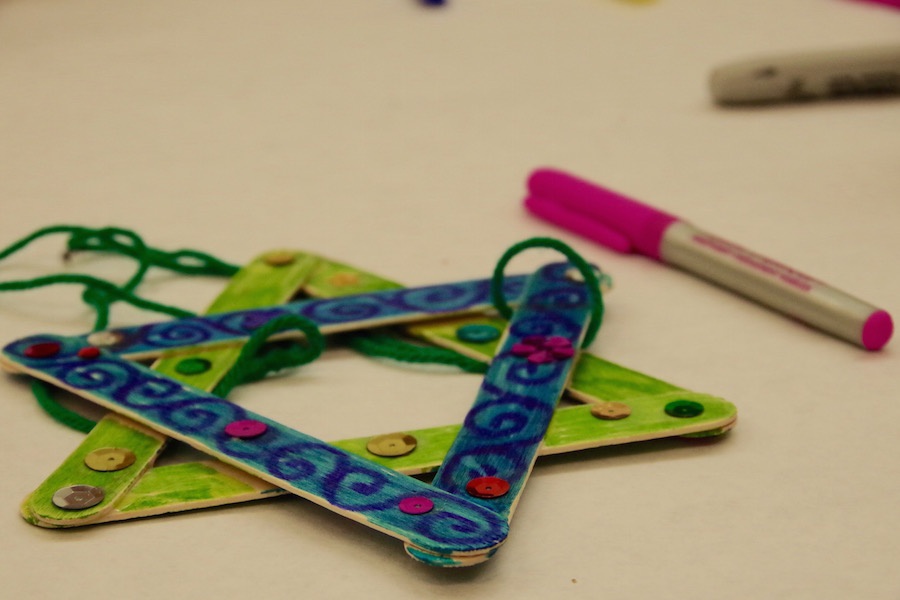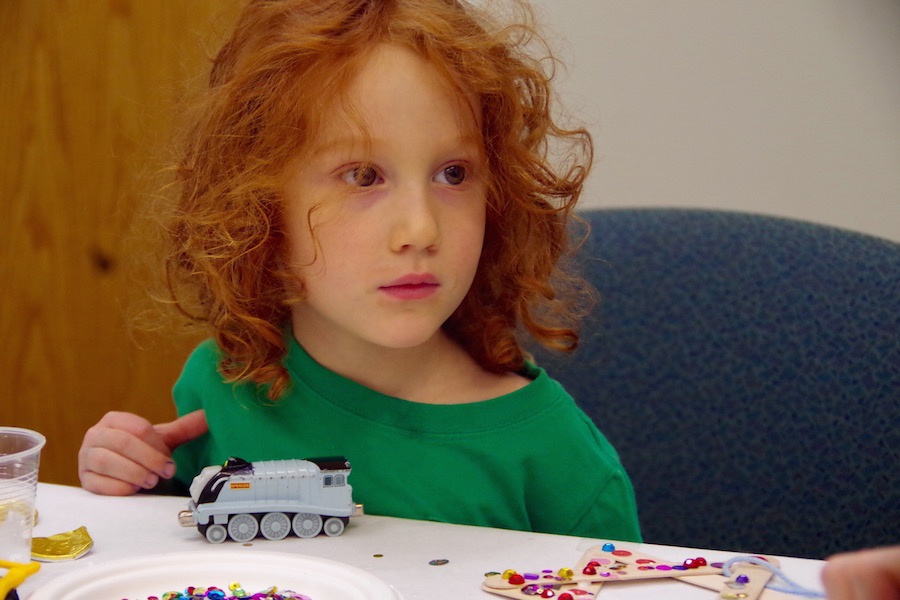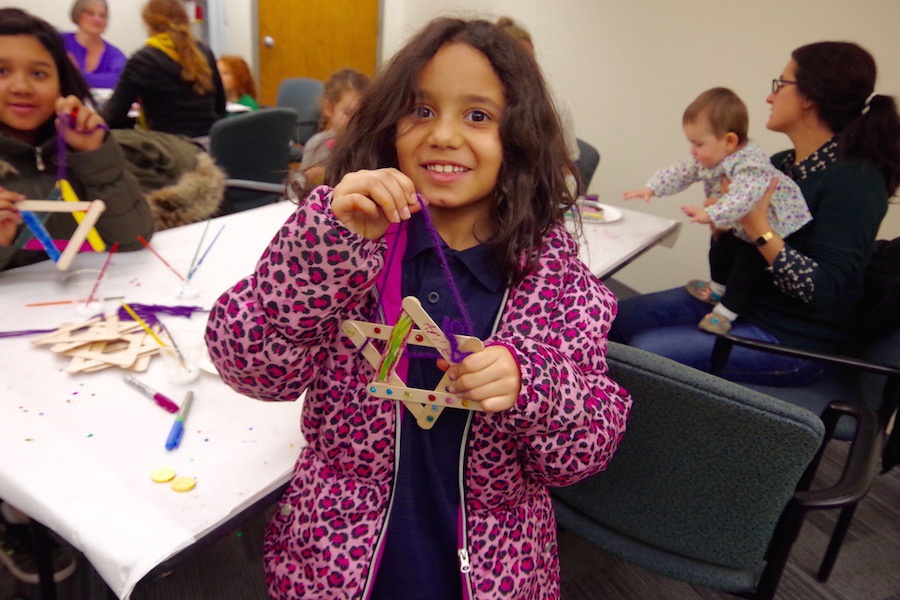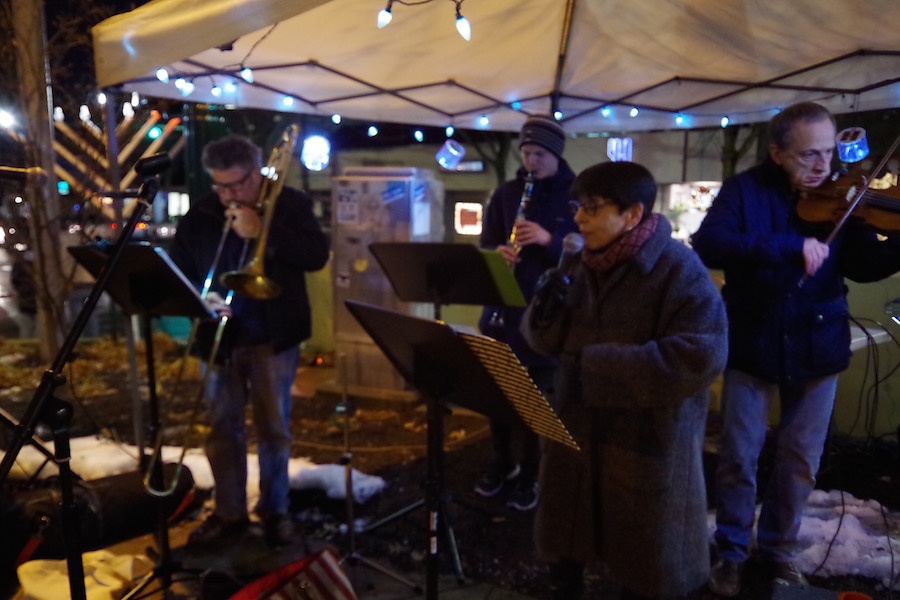Three Brachot floated through the air. The sufganiyot and cider had been laid out on a fold-up table. Gelt and dreidels beckoned from the library across the street. And on cue, a shaft of light sprang up into the shamash candle, into a bulb at the end of the menorah, and then on to the just-dark sky.
Tuesday night, a small but jubilant crowd gathered in Westville to celebrate the beginning of Hanukkah with holiday-themed books and crafts, a short Hanukkah parade and menorah lighting. This year marks the 11th annual year of festivities and the fourth or fifth for the menorah lighting.

One of the available crafts available at the Mitchell Branch of the New Haven Free Public Library. Lucy Gellman Photo.
While previous years have been anchored by the Chabad of Westville, this year’s celebration was a collaboration between the Westville Village Renaissance Alliance (WVRA), Jewish Community Center of Greater New Haven, Beth El Keser Israel (BEKI) and Mitchell Branch of the New Haven Free Public Library.
Also referred to as the “Festival of Lights,” Hanukkah celebrates the second-century victory of Judah the Maccabee and his band of Jewish soldiers against the larger Seleucid army, during which they reclaimed and rededicated the Holy Temple in Jerusalem. As the story tells it, the group needed oil to relight the menorah, and found only a trace amount remaining. But instead of lasting for just one day, it fueled the menorah for eight, bringing light into the post-battle darkness and the religious lives that the Seleucids had tried unsuccessfully to snuff out.
In commemoration of that miracle, Jews light a menorah for eight nights, using a ninth shamash candle to light the others. Oil-fried foods, particularly potato latkes and jelly-filled donuts called sufganiyot, are customary.
As Mayor Toni Harp lit a menorah downtown on the New Haven Green, Mitchell Branch Manager Sharon Lovett-Graff rounded up a group of 20 kids and parents who had come out to listen to Hanukkah books, decorate popsicle-stick Magen Davids and learn about dreidel games and candle lighting.

The best part of Hanukkah, according to Lev? Everything. He also said he likes the donuts that he gets to eat. Lucy Gellman Photo.
At one table, 4-year-old Lev and his mom Shanon (they declined to give last names) put the final touches on a bejeweled Magen David, the shiny plastic stones catching in the light. When asked his favorite part of the holiday, Lev laid another jewel onto the star, and then replied, “Everything” without missing a beat.
At another table, Arilei Rivera and her sisters Leilani and Ariana were just learning about the holiday for the first time. All Westvillians, they had come to the library with their mom to learn about how Hanukkah isn’t really a Jewish sort of Christmas—their holiday of choice—at all. Instead, it’s a celebration of its own customs, with some festive games that Arilei said delighted her.
“My favorite part is the dreidel,” she said, taking one of Leilani’s foil-plated pieces of gelt and unwrapping it to reveal milk chocolate.

Arilei Rivera: Dreidel for the win. Lucy Gellman Photo.
She stuck around for the parade. Handing each kid a small plastic lantern, Lovett-Graff led the group down a candle-studded path in Beecher Park to the public parking lot at the corner of Whalley Avenue and Blake Street, where a tent, unlit menorah, and members of Nu Haven Kapelye were waiting.
The day’s rain, early dusk and dropping temperatures didn’t deter attendees, close to 15 of whom were waiting for the parade as it arrived. Gathering close to the tent, kids and parents waited for the event to begin. For some, it was one of hundreds of menorah lightings they’d attended, or hosted in their homes. For others, like Arilei, it was a first.
“It’s my first time attending, let alone participating, so I’m very excited,” said BEKI congregant and outreach guru Shoshana Zax. “We know that Hanukkah is a celebration of renewal and rededication, it’s a time where we get to be hopeful, and we bring light at a time of darkness.”
Just past 5 p.m., Zax led attendees in three Hanukkah Brachot or blessings that are necessary for the Hanukkah candle lighting. As WVRA Executive Director Lizzy Donius lit the menorah, a great cheer rose up from the crowd. The band—Isaiah Cooper on trombone, Steve Jacobs on violin, Eran Avni-Singer on clarinet, and Hedda Rubenstein on vocals—launched into a rousing “Hanukkah, O’ Hanukkah!,” Rubenstein switching from English to Yiddish between verses.
"I love it!" said Donius, who added that she grew up Catholic, but was surrounded by Jewish families in her native Westchester County. "Because it's celebrating warmth. I love the whole idea of the festival of lights."
In front of the tent, Zax led a group in the hora, the group expanding and contracting as the band pressed on to “Sevivon sov sov sov” and the folksy, socialist “Ale brider” in Yiddish.
Un mir zaynen ale brider,/oy, oy, ale brider,/Un mir zingen freylekhe lider, oy, oy, oy, sang Rubenstein. The circle grew, dancers clasping hands as they shifted clockwise. Un mir haltn zikh in eynem,/Oy, oy, zikh in eynem,/Azelkhes iz nito bay keynem, oy, oy, oy.

“It’s fun,” said Helene Sapadin, a longtime congregant at BEKI who was coming to the lighting for the first time. “I didn’t expect so many people to turn out. There’s nothing like live music to bring people together.”
While it didn’t hang over the celebration, Zax said she recognized that this year’s celebration came at a particular moment, as Donald J. Trump recognizes Israel’s capital as not Tel Aviv but Jerusalem. But, she said, she’s choosing to concentrate on the holiday’s light, instead of any surrounding darkness.
“I think of it more globally,” she said. “It feels like values are being desecrated or tarnished—and that’s very much the Hanukkah story. I’m looking for ways to be hopeful and optimistic. You have to find something positive and be a source of good.”